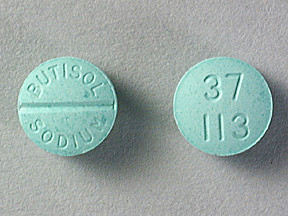BUTABARBITAL - ORAL
PHONETIC PRONUNCIATION: (BUE-ta-BAR-bi-tal)
COMMON BRAND NAME(S): Butisol
GENERIC NAME(S): butabarbital sodium
Uses
USES: Butabarbital is used to help calm you during periods of anxiety or before surgery. Butabarbital belongs to a class of drugs known as barbiturate hypnotics. It works by affecting certain parts of the brain to calm you.
How to use BUTABARBITAL - ORAL
HOW TO USE: For anxiety, take this medication by mouth as directed by your doctor, usually 3 to 4 times daily. For use before surgery, take as directed by your doctor. Dosage is based on your medical condition, age, and response to treatment. If you are taking the liquid form, carefully measure your dose using a medication-measuring device or spoon. Do not use a household spoon because you may not get the correct dose. Do not take more of this medication than prescribed. Doing so may increase side effects. This medication may cause withdrawal reactions, especially if it has been used regularly for a long time or in high doses. In such cases, withdrawal symptoms (such as anxiety, vivid dreams, shaking hands/fingers, twitching, trouble sleeping) may occur if you suddenly stop using this medication. Withdrawal from butabarbital can be severe and include hallucinations, seizures and (rarely) death. To prevent withdrawal reactions, your doctor may reduce your dose gradually. Consult your doctor or pharmacist for more details, and report any withdrawal reactions right away. Though it helps many people, this medication may sometimes cause addiction. This risk may be higher if you have a substance use disorder (such as overuse of or addiction to drugs/alcohol). Take this medication exactly as prescribed to lower the risk of addiction. Ask your doctor or pharmacist for more details. When this medication is used for a long time for anxiety, it may not work as well. Butabarbital should only be used for a short time for anxiety. Talk with your doctor if this medication stops working well. Tell your doctor if your condition persists or worsens (such as continued anxiety) after 7 to 10 days.
Side Effects
Precautions
Interactions
Overdose
Images

- color
- green
- shape
- round
- imprint
- BUTISOL SODIUM, 37 113
Reviews
Faq for BUTABARBITAL - ORAL
Butabarbital is a prescription medication that belongs to the class of drugs known as barbiturates. It is used for the short-term treatment of sleep problems (insomnia).
Butabarbital works by depressing the central nervous system, which helps to induce sleep and relieve insomnia.
The recommended dosage of butabarbital varies depending on the individual and their condition. It is important to follow the dosage instructions provided by your healthcare provider.
Common side effects of butabarbital may include drowsiness, dizziness, headache, nausea, and vomiting. Contact your doctor if you experience any severe or persistent side effects.
Yes, butabarbital has a high potential for dependence and addiction. It should only be used as directed by a healthcare professional, and the use should not exceed the prescribed duration.
No, it is not recommended to consume alcohol while taking butabarbital. Alcohol can increase the sedative effects of the medication and may cause excessive drowsiness or respiratory depression.
Butabarbital is intended for short-term use only. It is typically prescribed for a few days to a few weeks to treat insomnia. Using it for an extended period can lead to tolerance, dependence, and withdrawal symptoms.
No, it is not safe to drive or operate machinery while under the influence of butabarbital. The medication can cause drowsiness, impairing your ability to perform tasks that require alertness.
No, you should not abruptly stop taking butabarbital without consulting your doctor. A gradual tapering schedule may be required to avoid withdrawal symptoms.
Disclaimer
IMPORTANT: HOW TO USE THIS INFORMATION: This is a summary and does NOT have all possible information about this product. This information does not assure that this product is safe, effective, or appropriate for you. This information is not individual medical advice and does not substitute for the advice of your health care professional. Always ask your health care professional for complete information about this product and your specific health needs.
No Reviews Yet